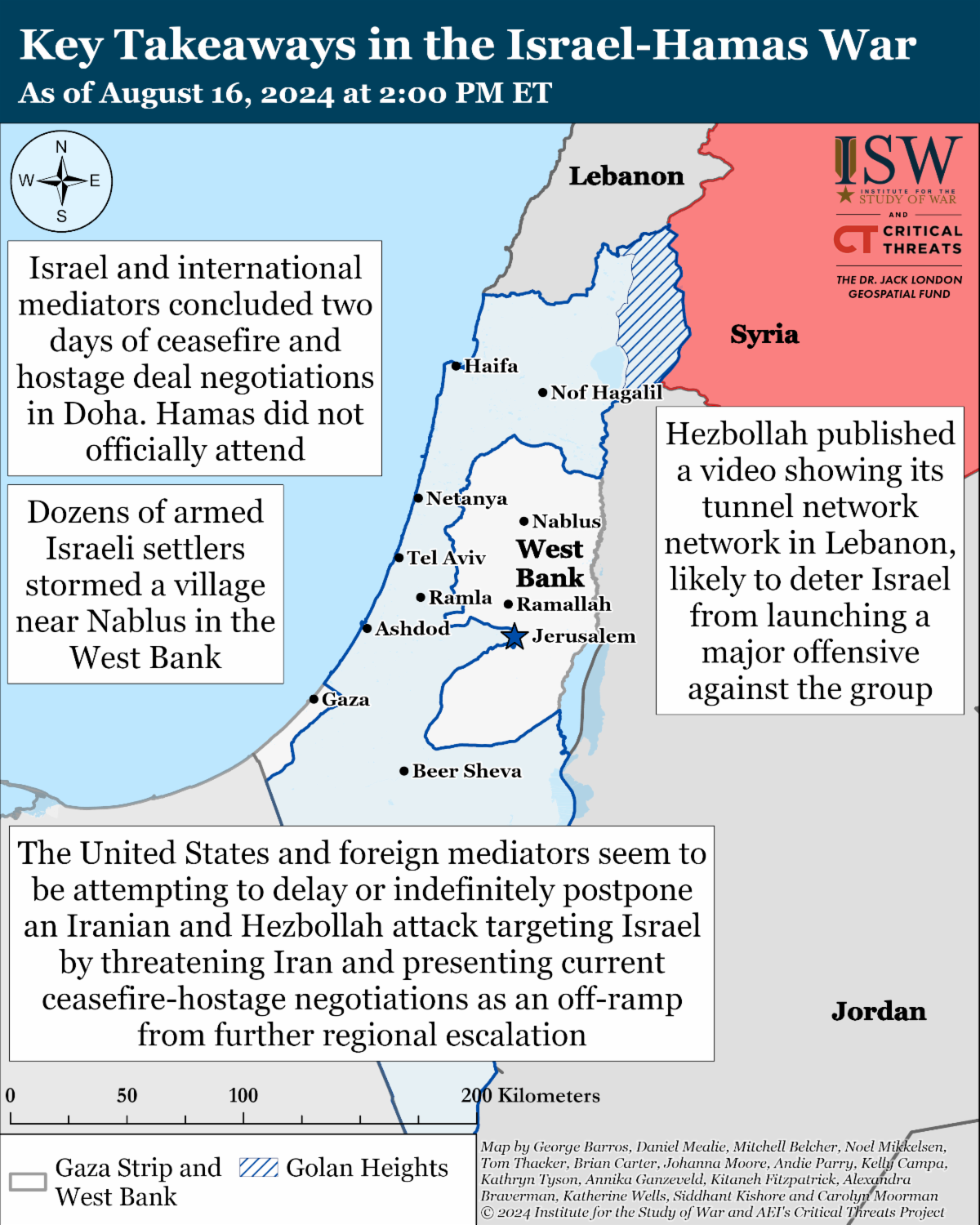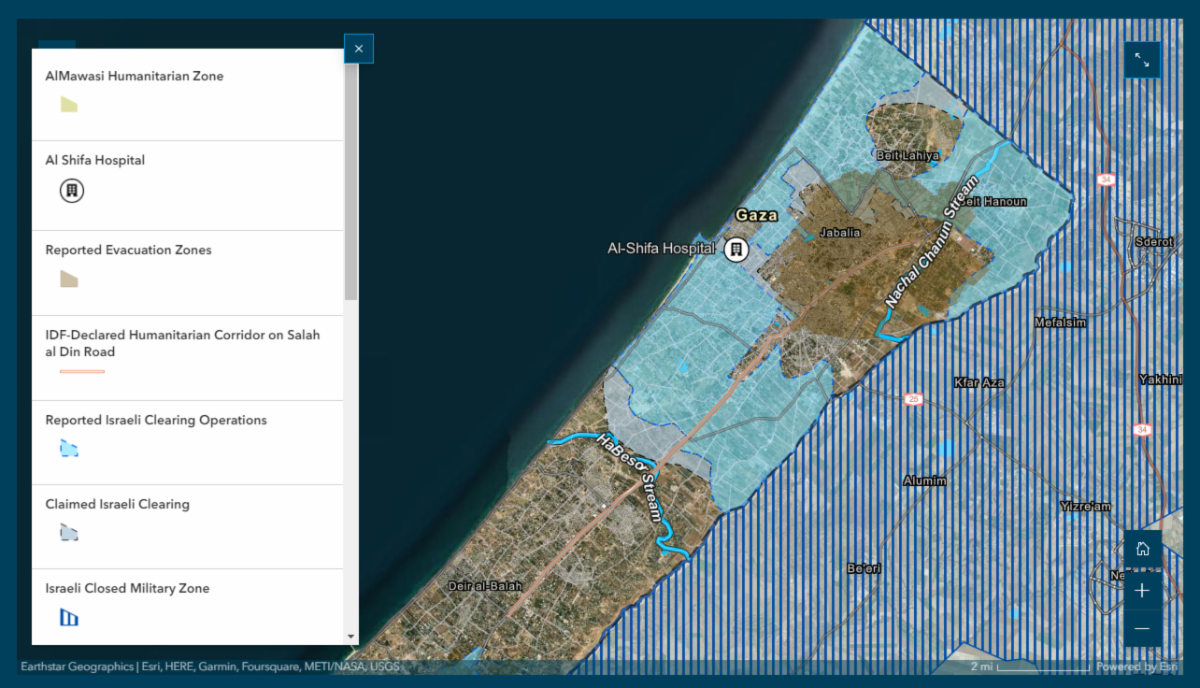The United States and foreign mediators seem to be attempting to delay or indefinitely postpone an Iranian and Hezbollah attack targeting Israel by both threatening Iran and presenting a potential ceasefire-hostage agreement as an off-ramp from further regional escalation. Both the United States and Israel have signaled that a strike would be met with a significant military response while indicating optimism toward a ceasefire-hostage agreement. The United States recently warned Iran that an Iranian attack on Israel could trigger a “robust military response” from Israel. Israel practiced aerial refueling of fighter jets in Israeli airspace and “simulated long-range flights deep into enemy territory” on August 16 to signal to Iran and Hezbollah its readiness to respond to any attack. CTP-ISW continues to assess that Iran likely seeks to restore deterrence with Israel while simultaneously trying to avoid a large-scale war. A major military response against Iran in the wake of an Iranian strike would demonstrate it had not re-established deterrence while simultaneously increasing the risk of a wider war.
The United States and foreign mediators are also framing a potential ceasefire-hostage agreement as a necessary measure to de-escalate tensions in the region. US President Joe Biden reportedly views the deal as the “key...to preventing a regional war,” and he said that he “expects” that Iranian leaders will delay or indefinitely postpone a strike if a ceasefire agreement is reached. It remains unclear if “hold off” means that Iranian leaders would decline to mount any retaliatory strike on Israel, or just that Iran would delay its strike. Qatari Prime Minister Mohammed bin Abdulrahman bin Jassim al Thani warned Iran about the “grave consequences” of conducting an attack on Israel “at the very moment there are signs of diplomatic progress” during a phone call with Iranian Acting Foreign Affairs Minister Ali Bagheri Kani on August 15, according to an unspecified diplomat who spoke to the Washington Post. It is unclear whether the “grave consequences” Thani warned Iran about are related to the current military situation in the Gaza Strip or the region more broadly.
There are some indications that Iran will wait until the current ceasefire negotiations conclude to conduct an attack on Israel. The United States, Egypt, and Qatar announced on August 16 that ceasefire negotiations will resume in Cairo “before the end of next week.” CBS reported that the United States previously assessed that Iran would not attack Israel during the two-day ceasefire negotiations in Doha on August 15 and 16. It is unclear, however, whether Iran will postpone its attack until the next round of negotiations in Cairo takes place. Iranian Supreme Leader Ali Khamenei said on August 14 that a “non-tactical retreat” from a retaliatory strike targeting Israel was unacceptable, implying that a tactical retreat would be acceptable. This suggests Khamenei may have delayed the strike to account for ceasefire negotiations. Five Israeli officials told The New York Times on August 16 that the Israeli intelligence community assessed that Iran and Hezbollah have lowered the level of alertness of their missile and rocket units. Israel also assessed that Hezbollah will not retaliate against Israel so long as ceasefire negotiations continue with “high intensity” because it “does not want to be perceived as undermining the prospects [of a ceasefire agreement].” These indications do not confirm that Iran and Hezbollah will hold off on conducting an attack on Israel until the next round of negotiations takes place. It is also unclear whether a ceasefire agreement would prevent Iran from attacking Israel altogether. Senior Iranian officials and members of the chain of command have not raised the idea of indefinitely postponing or canceling Iran’s retaliation if a ceasefire agreement is reached, although they likely would avoid doing so during negotiations in order to retain leverage.
Key Takeaways:
- Iranian Retaliation: The United States and foreign mediators seem to be attempting to delay or indefinitely postpone an Iranian and Hezbollah attack targeting Israel by both threatening Iran and presenting a potential ceasefire-hostage agreement as an off-ramp from further regional escalation. There are some indications that Iran will wait until the current ceasefire negotiations conclude to conduct an attack on Israel.
- Hostage-ceasefire negotiations: US and international mediators are expressing optimism about ceasefire and hostage talks that Hamas did not officially participate in. Israeli and Arab reports suggest that the talks have not resolved the two largest residual issues which both concern Israel’s presence in the Gaza Strip during a ceasefire.
- Lebanon: Lebanese Hezbollah published a video on August 16 showing a network of its tunnels in Lebanon. The video further publicizes the development of Hezbollah’s capabilities, likely in part to deter Israel from launching a major offensive against the group.
- West Bank: Dozens of armed Israeli settlers stormed a village near Nablus in the West Bank on August 15. At least 70 settlers set fire to vehicles and homes and threw firebombs and rocks in Jit, west of Nablus, according to Western media.
- Iran-China Relations: Iran is reportedly seeking security partnerships with two Chinese satellite companies specializing in low-cost satellites capable of capturing high-resolution imagery. This capability could enable Iran to enhance its intelligence-gathering capabilities to improve the effectiveness of its strikes.
- Iraq: University of Tehran President Mohammad Moghimi announced on August 15 that the University of Tehran will accept members of the Iraqi Popular Mobilization Forces (PMF) without university entrance exams.
| 






 [ISW] 이스라엘-하마스 전쟁(이란) 업데이트, 2024년 8월 17일
[ISW] 이스라엘-하마스 전쟁(이란) 업데이트, 2024년 8월 17일
 [ISW] 이스라엘-하마스 전쟁(이란) 업데이트, 2024년 8월 14일
[ISW] 이스라엘-하마스 전쟁(이란) 업데이트, 2024년 8월 14일